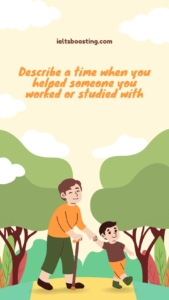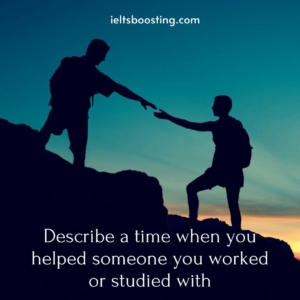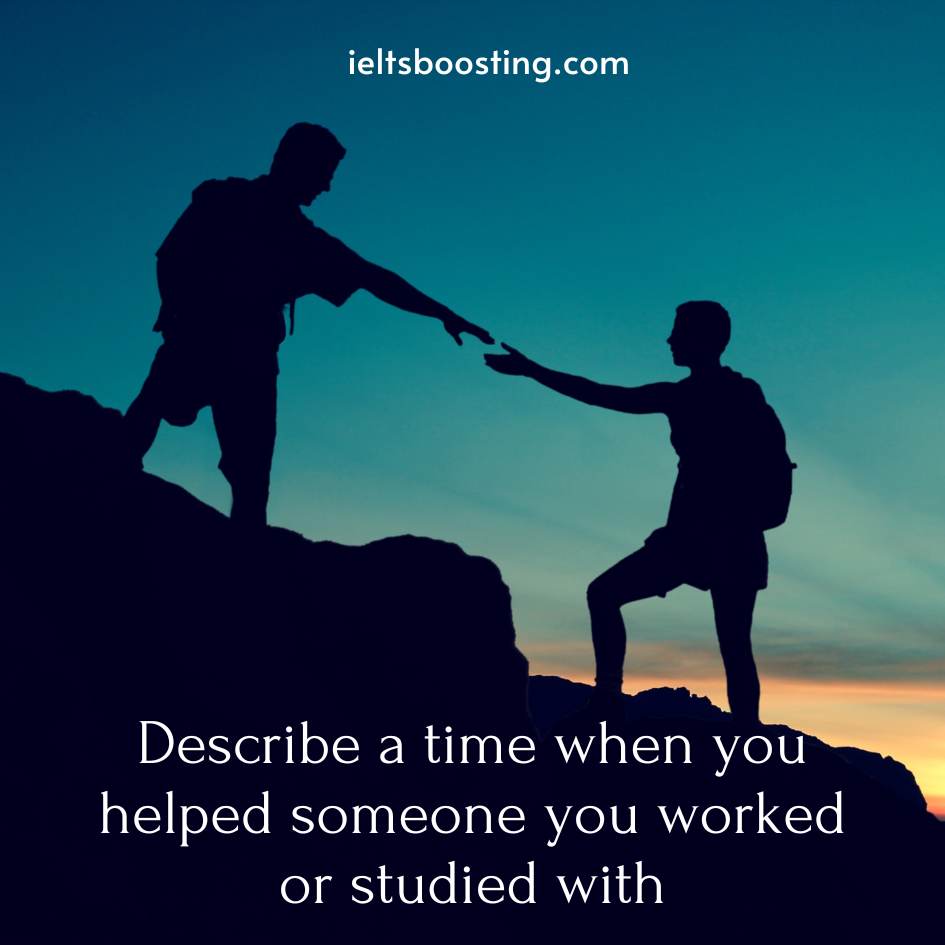Describe a time when you helped someone (you worked or studied with)
You should say:
Who you helped
Why you helped him/her
How you helped him/her
And explain how you felt about the experience

Describe a time when you helped someone you worked or studied with
Sample answer to describe a time when you helped someone you worked or studied with
I remember a time when I helped a colleague in my content creator team. She had just joined the company and was fairly new to the industry. Understanding the challenges of being new in such a dynamic field, I decided to lend a hand.
I started by sharing with her a list of useful websites that I had found invaluable for learning different content creation techniques. These sites were full of tutorials, industry insights, and practical tips that I knew would be helpful for a beginner. I also introduced her to several online groups and communities where content creators share ideas, give feedback, and support each other. It’s a great way to stay updated and connected with industry trends and practices.
Furthermore, I recommended a book that was instrumental in my own learning journey. It covered the fundamentals of content creation, from conceptualization to execution, which I believed would be beneficial for her.
Helping her out made me feel really good. It reminded me of when I was new and how much I appreciated the guidance I received. It was satisfying to see her confidence grow as she became more skilled and knowledgeable in her role. This experience reinforced the importance of teamwork and supporting each other in a professional setting.
Can combine with:
Describe a peson who is good at teamwork

Describe a time when you helped someone you worked or studied with
Part 3 – Describe a time when you helped someone you worked or studied with
Should people be very kind when they help others?
Definitely, kindness should be at the core when people help others. Being kind not only makes the act of helping more genuine but also ensures that the person being helped feels respected and valued. However, it’s important that kindness doesn’t lead to overstepping boundaries or making the other person feel uncomfortable. Ultimately, the balance between kindness and respect is key in making help both effective and meaningful.
Useful Vocabulary:
- Kindness: The quality of being friendly, generous, and considerate.
- Genuine: Truly what something is said to be; authentic.
- Respected: Admired or held in high esteem.
- Valued: Considered to be important or beneficial.
- Overstepping: Exceeding normal or acceptable limits.
- Boundaries: Limits of acceptable behavior or a particular area.
- Uncomfortable: Causing or feeling slight pain or physical discomfort.
- Balance: A condition in which different elements are equal or in the correct proportions.
- Effective: Successful in producing a desired or intended result.
- Meaningful: Having a serious, important, or useful quality or purpose.
Should children be taugh to be kind to others?
Absolutely, teaching children to be kind to others is crucial for their personal development and social interactions. Firstly ,when children learn kindness, they develop empathy and understanding towards others, which are essential qualities for building healthy relationships. Another plus point that we should teach them kindness is because it can prevent or reduce bullying, and foster happiness and well-being.
Useful Vocabulary:
- Crucial: Extremely important or necessary.
- Personal development: The process of improving oneself through behaviors, activities, and attitudes.
- Social interactions: The process by which individuals act and react in relation to others.
- Empathy: The ability to understand and share the feelings of another.
- Understanding: Sympathetically aware of other people’s feelings; tolerant and forgiving.
- Healthy relationships: Positive and supportive connections with others.
- Harmonious: Free from disagreement or dissent.
- Cooperative: Involving mutual assistance in working toward a common goal.
- Communities: Groups of people living in the same place or having a particular characteristic in common.
- Compassionate: Feeling or showing sympathy and concern for others.

Describe a time when you helped someone you worked or studied with
How do you compare kindness with other qualities?
Kindness, when compared to other qualities, stands out as a universally appreciated value. It’s often seen as more approachable than intelligence or ambition, as kindness directly impacts how we treat others. While qualities like determination and honesty are crucial for personal success, kindness fosters a sense of community and empathy. In essence, kindness is the glue that holds social interactions together, making it equally, if not more important, than other individualistic traits.
Useful Vocabulary:
- Universally: By everyone; in every case.
- Appreciated: Recognized with gratitude; valued.
- Approachable: Friendly and easy to talk to.
- Intelligence: The ability to acquire and apply knowledge and skills.
- Ambition: A strong desire to do or achieve something.
- Impacts: Has an effect on; influences.
- Determination: Firmness of purpose; resoluteness.
- Honesty: The quality of being honest; truthfulness.
- Fosters: Encourages the development of something.
- Community: A group of people living in the same place or having a characteristic in common.
- Empathy: The ability to understand and share the feelings of another.
- Social interactions: Exchanges between people.
- Individualistic: Characteristic of someone who values independence and self-reliance.
Simpler version
When you think about kindness versus other traits, it really shines through as something everyone values. It’s kind of like this friendly quality that’s easier to relate to than, say, being super smart or ultra-ambitious. Don’t get me wrong, being determined and honest is great for getting ahead, but kindness? It’s what brings people together, creates that sense of community. It’s like the secret ingredient that makes all our interactions a bit warmer and more meaningful.


